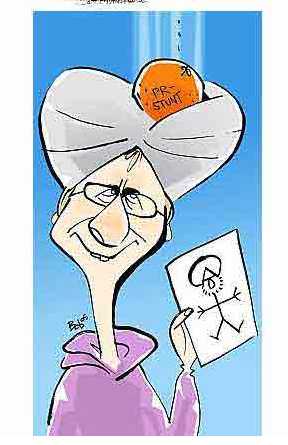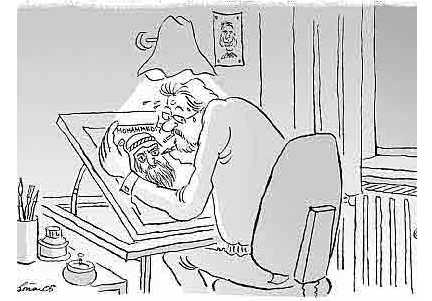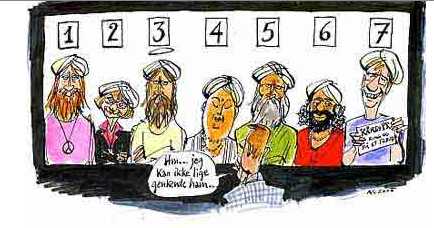From the BBC:
Conservatives and Lib Dems in the House of Lords say they will continue to oppose identity card plans despite MPs rejecting their earlier objections.
Ministers say anyone getting a passport should have to get an ID card and be registered on a database. Opposition peers say people should have a choice.
Guess my letter must have helped! You send one as well!
28 February, 2006
Public support and oppose ID cards!?
From the Telegraph:
Public support for identity cards is far lower than the Government claims, an opinion poll for The Daily Telegraph shows today. Ministers maintain that 80% of voters back their plans for the cards and want them introduced quickly. But a YouGov survey has found that just 52% back the plans
The public shows no sign of looking forward to the introduction of identity cards.
People doubt whether cards will materially assist in the war on terror and clearly think that a national scheme will be shot full of holes. Yet a small majority, 52%, persist in saying that the cards should be brought in. They appear not to have noticed the contradiction between their long-standing predilection for cards and their up-to-date assessment of what having cards will actually mean.
However, only 21% believe cards will reduce the chances of further terrorist atrocities and opinion is evenly divided on whether they will make it easier for the police to catch criminals.
There is an almost equal division on whether having cards will make people's lives more convenient.
Opinions on the negative side of the debate are far more one-sided. Every one of the seven negative statements receives majority support, most of them by a wide margin. No fewer than 80% of YouGov's respondents are convinced that determined criminals and potential terrorists will always find a way of forging the cards.
More than 70% of those in the survey believe that the proposed national system of cards will be enormously expensive to install and maintain and will certainly cost far more than the Government claims.
More than 70 % are also convinced that some of the data stored on people's cards will inevitably be leaked, sold, hacked into or used improperly in other ways.
Perhaps because they recall the passport fiasco of the late 1990s, 60% fear that the introduction of cards will be time-consuming and cause an immense amount of disruption and inconvenience.
Roughly 61% fear that the data on people's cards will sometimes be passed on without proper authorisation to foreign governments and other foreign agencies.
Given the experiences people have already had with credit cards, it may be surprising that fewer – 55% - believe a portion of the material stored on the cards will inevitably contain errors of one kind or another. Roughly the same proportion, 50%, believes that the equipment that reads the cards is bound from time to time to malfunction and fail to read the cards accurately.
Overall the proportion of the population that believes the cards will be largely fool-proof and forgery-proof and that they will also be cost-effective appears to be no more than 30%.
Even so, 52% of people still say that they favour a national ID scheme.
WTF? Despite all of the above, a majority of people are still in favour!?
Public support for identity cards is far lower than the Government claims, an opinion poll for The Daily Telegraph shows today. Ministers maintain that 80% of voters back their plans for the cards and want them introduced quickly. But a YouGov survey has found that just 52% back the plans
The public shows no sign of looking forward to the introduction of identity cards.
People doubt whether cards will materially assist in the war on terror and clearly think that a national scheme will be shot full of holes. Yet a small majority, 52%, persist in saying that the cards should be brought in. They appear not to have noticed the contradiction between their long-standing predilection for cards and their up-to-date assessment of what having cards will actually mean.
However, only 21% believe cards will reduce the chances of further terrorist atrocities and opinion is evenly divided on whether they will make it easier for the police to catch criminals.
There is an almost equal division on whether having cards will make people's lives more convenient.
Opinions on the negative side of the debate are far more one-sided. Every one of the seven negative statements receives majority support, most of them by a wide margin. No fewer than 80% of YouGov's respondents are convinced that determined criminals and potential terrorists will always find a way of forging the cards.
More than 70% of those in the survey believe that the proposed national system of cards will be enormously expensive to install and maintain and will certainly cost far more than the Government claims.
More than 70 % are also convinced that some of the data stored on people's cards will inevitably be leaked, sold, hacked into or used improperly in other ways.
Perhaps because they recall the passport fiasco of the late 1990s, 60% fear that the introduction of cards will be time-consuming and cause an immense amount of disruption and inconvenience.
Roughly 61% fear that the data on people's cards will sometimes be passed on without proper authorisation to foreign governments and other foreign agencies.
Given the experiences people have already had with credit cards, it may be surprising that fewer – 55% - believe a portion of the material stored on the cards will inevitably contain errors of one kind or another. Roughly the same proportion, 50%, believes that the equipment that reads the cards is bound from time to time to malfunction and fail to read the cards accurately.
Overall the proportion of the population that believes the cards will be largely fool-proof and forgery-proof and that they will also be cost-effective appears to be no more than 30%.
Even so, 52% of people still say that they favour a national ID scheme.
WTF? Despite all of the above, a majority of people are still in favour!?
23 February, 2006
ID cards are already too expensive!
From the Manchester Evening News (see also the Mirror & Daily Telegraph):
The Government was accused of contempt for Parliament today after it emerged that it has spent £32 million preparing for ID cards before they have even become law.
Guess they want to waste as much taxpayer money on the system as possible…
The Government was accused of contempt for Parliament today after it emerged that it has spent £32 million preparing for ID cards before they have even become law.
Guess they want to waste as much taxpayer money on the system as possible…
20 February, 2006
Letter to the Lords
I have sent the following letter to the Lords from my area who will be voting on the ID cards Bill next months:
Dear X,
I am writing to you in advance of the House of Lords debate on the Identity Cards Bill, which is scheduled for 6th March 2006, as, being from XXX – where I spent the first 18 years of my life – I note that you are one of the Members who is the most local to me. I am writing to ask that you vote against the amendments that were passed by the House of Commons and in favour of the reinstating the amendments that your House inserted into the Bill at the start of the year.
I am against the Bill for a number of reasons, including the following:
Yours sincerely,
If you want to, you are freely entitled to copy/amend this to send to your own Lords, just link to this article. Thanks!
Dear X,
I am writing to you in advance of the House of Lords debate on the Identity Cards Bill, which is scheduled for 6th March 2006, as, being from XXX – where I spent the first 18 years of my life – I note that you are one of the Members who is the most local to me. I am writing to ask that you vote against the amendments that were passed by the House of Commons and in favour of the reinstating the amendments that your House inserted into the Bill at the start of the year.
I am against the Bill for a number of reasons, including the following:
- They will not prevent Terrorism, as has been shown by the unfortunate experience of people in Madrid, and also the Home Secretary himself stated as much in the aftermath of the London bombings last July.
- They will cost an exorbitant amount of money, according to the London School of Economics (LSE) in their review which they published last year, and have confirmed in subsequent updates. It is worth pointing out that the Government has not been able to counter their report, despite claiming that their own figures have been vetting by the accountancy firm KPMG, which the Government refuses to publish.
- The Salisbury convention does not apply in this situation, as the Government’s election manifesto only committed it to a “Voluntary” scheme, not a compulsory scheme, which is what the effect of the Bill will be.
- It has been shown that the technology does not work. For example, in tests, it has been shown that the facial recognition software only works on people who are white and young, i.e. they do not work on people from minority groups or are elderly. I do not feel it is in the Government’s interests to be passing a Bill which is in direct conflict with the Race Relations Act 1976, as well as various pieces of legislation on age discrimination. I would suggest that you see the LSE’s report for more.
- The government does not have an encouraging record when it comes to large-scale technology projects, for example, passports, the Civil Aviation Authority’s computer systems, NHS software upgrades.
- The proposed database to go with the cards is not something that should be encouraged, especially with the current fears over “Identity Theft”. As everybody’s personal details will be stored centrally, it only takes a few determined hackers to get into the system and cause complete havoc to the whole system.
- It has been shown in the Netherlands that biometric cards can be hacked (http://www.theregister.co.uk/2006/01/30/dutch_biometric_passport_crack/ ).
Yours sincerely,
If you want to, you are freely entitled to copy/amend this to send to your own Lords, just link to this article. Thanks!
How to get Labour out
Following on from the past few days in Parliament, comes a way to get rid of New Labour:Bloggers can play a role in defeating New Labour.
I fully support this. Living in Burnley, there’s a (very slight) possibility, going on the make-up of the Council, that the Lib Dems could take the seat – taking out the beloved Kitty Usher – if we got our act together, as the Lib Dems are the second biggest party on the Council. What could hold us back is that there is a significant BNP presence on the Council, which would draw votes from Labour; although this could be a positive, as long as enough votes are drawn from them.
- Liberal Labour bloggers can work within the party in an attempt to bring the control freaks to heel
- Lib Dem and Conservative bloggers can emphasise the links between the parties, and persuade activists to put aside old scores
- The non-partisan can continue to highlight issues and attack the govt on its record
I fully support this. Living in Burnley, there’s a (very slight) possibility, going on the make-up of the Council, that the Lib Dems could take the seat – taking out the beloved Kitty Usher – if we got our act together, as the Lib Dems are the second biggest party on the Council. What could hold us back is that there is a significant BNP presence on the Council, which would draw votes from Labour; although this could be a positive, as long as enough votes are drawn from them.
Local Elections 2006
Following-on to the campaign to get Labour out, here’s a list of all areas which are having local council elections in May. Burnley, which currently has “No Overall Control”, i.e. has a coalition (21 Labour, 11 Lib Dems, 6 BNP, 4 Tory, 3 Independent), is included.
Reasons
Blogzilla has a list of why Labour need kicking out, including amongst others:
- ID cards,
- Protests bans,
- Control Orders,
- ASBOs
- “Glorifying Terrorism”
- Attempting to abolish Parliament
No ID in Ireland
A few weeks ago I had an article which said that if we have ID cards over here, then they might be forced upon the Irish.
Now it appears that they won’t have to have them over there…
Now it appears that they won’t have to have them over there…
19 February, 2006
Fingerprints
From the Observer:
The credibility of Scotland's criminal justice system was in tatters last night after the country's most senior law officer effectively dismissed fingerprint evidence as junk science.
Colin Boyd QC, the Lord Advocate, took the unprecedented step of explaining his decisions in the case of former police officer Shirley McKie, who was wrongly accused of leaving her fingerprint at a murder scene in 1997. His intervention, rather than defusing the issue, led to repeated calls for an independent public inquiry.
On Friday, the Lord Advocate said 'there have always been, and there remain, conflicting expert views on the issue of identification of the relevant fingerprints'. He had concluded in 2001, after Tayside Police reported, 'that the conflict in expert evidence was such that there could be no question of criminal proceedings'.
Allan Bayle, a UK fingerprinting expert, said the disputed dab had been analysed by more than 170 experts in 18 countries. 'Every single person said there is no question, it was not Shirley McKie's.... Fingerprinting is now finished in Scotland.'
ID cards will have fingerprints on them, which is another reason they’re a complete waste of time.
The credibility of Scotland's criminal justice system was in tatters last night after the country's most senior law officer effectively dismissed fingerprint evidence as junk science.
Colin Boyd QC, the Lord Advocate, took the unprecedented step of explaining his decisions in the case of former police officer Shirley McKie, who was wrongly accused of leaving her fingerprint at a murder scene in 1997. His intervention, rather than defusing the issue, led to repeated calls for an independent public inquiry.
On Friday, the Lord Advocate said 'there have always been, and there remain, conflicting expert views on the issue of identification of the relevant fingerprints'. He had concluded in 2001, after Tayside Police reported, 'that the conflict in expert evidence was such that there could be no question of criminal proceedings'.
Allan Bayle, a UK fingerprinting expert, said the disputed dab had been analysed by more than 170 experts in 18 countries. 'Every single person said there is no question, it was not Shirley McKie's.... Fingerprinting is now finished in Scotland.'
ID cards will have fingerprints on them, which is another reason they’re a complete waste of time.
18 February, 2006
Driving licence & ID cards
From 2008/9, it won’t just be compulsory to have an ID card when you apply for a passport, you’ll also have to have one if you want a driving licence!
ID cards & discrimination
When I was in work on Thursday, I was speaking to one of my colleagues over ID cards. I told her that, being black, she won’t be able to have one, as the technology doesn’t work if you’re not white and/or old and/or blind, i.e. the technology is racist, ageist and discriminates against disabled people (see the LSE’s report on ID cards in full, but especially p. 139-150, 183-199).
I’ve now come across an article on why black and Asian people should be afraid of ID cards, as, shock-horror – they’ll more likely to be used against them compared to white people. It’s like the 1970s all over again – stop ‘n’ search, etc. When/where will we have another Brixton riot?
I’ve now come across an article on why black and Asian people should be afraid of ID cards, as, shock-horror – they’ll more likely to be used against them compared to white people. It’s like the 1970s all over again – stop ‘n’ search, etc. When/where will we have another Brixton riot?
16 February, 2006
No ID Cards until 2009
The Commons passes the ID Cards Bill on Tuesday stating that ID cards will be voluntary (read compulsory for anyone wanting to have a passport and/or driving licence) from 2008.
However, from Computer Weekly, comes this:
The government’s £5.8bn national ID card project has slipped back a year following delays in passing the ID card bill through Parliament, a government minister conceded yesterday.
Home Office minister Andy Burnham said that the first ID cards would not be introduced until 2009, a year later than originally planned.
I knew there’d be problems with ID cards, but, fuck me, I didn’t think they’d happen this quickly!
The £580m a year running cost of the scheme [according to the government, but not according to anyone else] does not include spending on ID cards by other government departments, who will have to make their own business cases for making use of ID cards.
But so far, Burnham said, other government departments had not approached the Home Office with funds for the project.
Maybe they’re thinking “You made the bed, you lie in it”…
It should also be pointed out that the government still has no idea about what it wants from the system!
It should be noted that every time the government has to make a statement defending ID cards, it’s Andy Burnham (MP for Leigh, i.e. a safe Labour seat) who makes it. He must be the scapegoat for when it all falls apart…
However, from Computer Weekly, comes this:
The government’s £5.8bn national ID card project has slipped back a year following delays in passing the ID card bill through Parliament, a government minister conceded yesterday.
Home Office minister Andy Burnham said that the first ID cards would not be introduced until 2009, a year later than originally planned.
I knew there’d be problems with ID cards, but, fuck me, I didn’t think they’d happen this quickly!
The £580m a year running cost of the scheme [according to the government, but not according to anyone else] does not include spending on ID cards by other government departments, who will have to make their own business cases for making use of ID cards.
But so far, Burnham said, other government departments had not approached the Home Office with funds for the project.
Maybe they’re thinking “You made the bed, you lie in it”…
It should also be pointed out that the government still has no idea about what it wants from the system!
It should be noted that every time the government has to make a statement defending ID cards, it’s Andy Burnham (MP for Leigh, i.e. a safe Labour seat) who makes it. He must be the scapegoat for when it all falls apart…
15 February, 2006
How to get Labour out
Following on from the past few days in Parliament, comes a way to get rid of New Labour:
Bloggers can play a role in defeating New Labour.
I fully support this. Living in Burnley, there’s a (very slight) possibility, going on the make-up of the Council that the Lib Dems could take the seat – taking out the beloved Kitty Usher – if we got our act together, as the Lib Dems are the second biggest party on the Council. What could hold us back is that there is a significant BNP presence on the Council, which would draw votes from Labour; although this could be a positive, as long as enough votes are drawn from them.
Bloggers can play a role in defeating New Labour.
- Liberal Labour bloggers can work within the party in an attempt to bring the control freaks to heel
- Lib Dem and Conservative bloggers can emphasise the links between the parties, and persuade activists to put aside old scores
- The non-partisan can continue to highlight issues and attack the govt on its record
I fully support this. Living in Burnley, there’s a (very slight) possibility, going on the make-up of the Council that the Lib Dems could take the seat – taking out the beloved Kitty Usher – if we got our act together, as the Lib Dems are the second biggest party on the Council. What could hold us back is that there is a significant BNP presence on the Council, which would draw votes from Labour; although this could be a positive, as long as enough votes are drawn from them.
Here come ID cards...
From the BBC:
Ministers have won a Commons vote making it compulsory for people to be given ID cards - and put on a register - when they apply for passports. The plans, rejected by peers last month, will now go back before the House of Lords.
Guess this means that when my passport comes up for renewal in 10 years time I won’t be renewing it. They don’t mention driving licences though; were they not included in this vote? Or was it not intended to include them anyway?
Earlier, MPs approved a measure requiring new legislation before ID cards are made compulsory for all.
I’d like to see if that’s what the House of Lords voted in favour of before I comment.
A list of Labour MPs who voted in favour of freedom is here. Not suprisingly, my MP - the dear Kitty Usher - voted with the government. Fucking New Labour robots, I'll dance on their graves.
UPDATE: you will have to have an ID card when you renew your driving licence!
Ministers have won a Commons vote making it compulsory for people to be given ID cards - and put on a register - when they apply for passports. The plans, rejected by peers last month, will now go back before the House of Lords.
Guess this means that when my passport comes up for renewal in 10 years time I won’t be renewing it. They don’t mention driving licences though; were they not included in this vote? Or was it not intended to include them anyway?
Earlier, MPs approved a measure requiring new legislation before ID cards are made compulsory for all.
I’d like to see if that’s what the House of Lords voted in favour of before I comment.
A list of Labour MPs who voted in favour of freedom is here. Not suprisingly, my MP - the dear Kitty Usher - voted with the government. Fucking New Labour robots, I'll dance on their graves.
UPDATE: you will have to have an ID card when you renew your driving licence!
12 February, 2006
Iran would fight back
From the Boston Globe:
Iran is prepared to launch attacks using long-range missiles, secret commando units, and terrorist allies planted around the globe in retaliation for any strike on the country's nuclear facilities, according to new US intelligence assessments and military specialists.
What? You mean that they’d want to defend themselves against an attack? How dare they?
What odds on an attack making Iraq even worse than it currently is by the Iranian-leaning groups no longer wanting to (officially) be on our side?
But military and intelligence analysts warn that Iran -- which a recent US intelligence report described as ''more confident and assertive" than it has been since the early days of the 1979 Islamic revolution -- could unleash reprisals across the region, and perhaps even inside the United States, if the hard-line regime came under attack.
Quite good odds then! Especially when hey make deals such as this:
Amid the escalating crisis around Iran's nuclear programme, Russia said Thursday that it will still arm Tehran with missiles that can secure nuclear facilities from attacks."We concluded a contract for the supply of air-defence systems to Iran and there is no reason not to fulfil it," Mikhail Dmitriyev, the head of Russia's military-technical cooperation agency, told journalists here.
Iran is prepared to launch attacks using long-range missiles, secret commando units, and terrorist allies planted around the globe in retaliation for any strike on the country's nuclear facilities, according to new US intelligence assessments and military specialists.
What? You mean that they’d want to defend themselves against an attack? How dare they?
What odds on an attack making Iraq even worse than it currently is by the Iranian-leaning groups no longer wanting to (officially) be on our side?
But military and intelligence analysts warn that Iran -- which a recent US intelligence report described as ''more confident and assertive" than it has been since the early days of the 1979 Islamic revolution -- could unleash reprisals across the region, and perhaps even inside the United States, if the hard-line regime came under attack.
Quite good odds then! Especially when hey make deals such as this:
Amid the escalating crisis around Iran's nuclear programme, Russia said Thursday that it will still arm Tehran with missiles that can secure nuclear facilities from attacks."We concluded a contract for the supply of air-defence systems to Iran and there is no reason not to fulfil it," Mikhail Dmitriyev, the head of Russia's military-technical cooperation agency, told journalists here.
LSE vs Home Office
From the Times:
An academic claims he is being hounded by ministers for criticising the government’s identity card scheme and has compared himself to Dr David Kelly, the scientist who committed suicide over the Iraq weapons scandal.
Simon Davies, a visiting fellow at the London School of Economics (LSE), says he has lost valuable consultancy work and seen his income fall to below £10,000 a year as a result of ministers’ repeated personal attacks.
Davies has been backed by the director of the LSE, Sir Howard Davies, a former chairman of the Financial Services Authority, who said his complaints to Tony Blair about the treatment of the academic and the LSE had been ignored.
“Independent academics have done their best to produce costing for the scheme and the report has been dismissed,” he said. “This is brutal politics because ministers are desperate to win the vote on identity cards.”
When will people learn? You can’t go around criticising the government and its policies! Memo to Mr Davies: stay out of the woods & light aircraft.
What I find strange, though, is the following:
Blair last week agreed a compromise that new legislation would be introduced before the cards became compulsory. Ministers have refused to reveal the findings of a new official study of the cost, conducted by consultants KPMG.
Davies was one of a group of academics at the LSE whose investigation found the costs of the national identity card scheme would be as much as £19 billion — three times the government’s initial estimate.
Surely, if the government had a report which supported its policies, it would publish it and so discredit it opponents… The lack of action on the government’s behalf suggests they know he’s right, which would lead to the attempted destruction of his career… just like Dr. Kelly.
An academic claims he is being hounded by ministers for criticising the government’s identity card scheme and has compared himself to Dr David Kelly, the scientist who committed suicide over the Iraq weapons scandal.
Simon Davies, a visiting fellow at the London School of Economics (LSE), says he has lost valuable consultancy work and seen his income fall to below £10,000 a year as a result of ministers’ repeated personal attacks.
Davies has been backed by the director of the LSE, Sir Howard Davies, a former chairman of the Financial Services Authority, who said his complaints to Tony Blair about the treatment of the academic and the LSE had been ignored.
“Independent academics have done their best to produce costing for the scheme and the report has been dismissed,” he said. “This is brutal politics because ministers are desperate to win the vote on identity cards.”
When will people learn? You can’t go around criticising the government and its policies! Memo to Mr Davies: stay out of the woods & light aircraft.
What I find strange, though, is the following:
Blair last week agreed a compromise that new legislation would be introduced before the cards became compulsory. Ministers have refused to reveal the findings of a new official study of the cost, conducted by consultants KPMG.
Davies was one of a group of academics at the LSE whose investigation found the costs of the national identity card scheme would be as much as £19 billion — three times the government’s initial estimate.
Surely, if the government had a report which supported its policies, it would publish it and so discredit it opponents… The lack of action on the government’s behalf suggests they know he’s right, which would lead to the attempted destruction of his career… just like Dr. Kelly.
11 February, 2006
War on Drugs failure, redux
Last summer it was leaked to the press that the government admits that the War on Drugs was a complete failure. However, the follow-up report (which formed the basis of the completely pointless Drugs Act 2005) was not released, until now that is.
There’s a good analysis of it on Transform:
The report says if heroin prescription for registered addicts was widely adopted, the £4bn a year demand for illegal heroin and crack cocaine would drop significantly. It would be better to draw the 260,000 heroin users who have serious habits funded through crime into an environment where they can inject safely and be persuaded to move towards abstinence. "In principle, there is a strong rationale for a more widespread use of heroin prescription in the treatment system," says Lord Birt.
He says there is a general consensus among doctors that heroin prescription can help older heroin users, but that expert opinion is divided, with some arguing it would attract new users. Trials in Switzerland and the Netherlands suggest such schemes can cut crime and improve users' health. The strategy unit recommended starting £2m a year pilot schemes in Britain to establish the evidence here. The Birt report concludes that "introducing such a policy would be contentious and disruptive, though the gains, especially in reducing crime, should be substantial".
Although the cabinet did not adopt Lord Birt's proposal to make heroin use a crime or introduce more widespread heroin prescribing, the more coercive approach he recommended has been included in the Drugs Act 2005. Its measures include the compulsory drug testing of 240,000 suspects a year arrested for drug-related crimes.
There’s a good analysis of it on Transform:
- Acknowledges that supply side interventions are futile but argues that they should be continued anyway;
- Calls for drug seizures to be ‘proclaimed’ despite acknowledging that seizures are ineffective at reducing availability or drug harms;
- Notes that increased drug availability does not increase problematic drug use - thereby torpedoing one of the central tenets of the UK drug strategy, and one of the major arguments against legalisation, control and regulation of drugs;
- Analyses current intervention programmes in detail and concludes they are ineffective at reducing crime harms because too many ‘High Harm Causing Users’ who come into contact with the Criminal Justice System slip through the net. It suggests that planned changes (pre-Drugs Act 2005) will only have a marginal impact;
- Recommends that heroin use be criminalised, and a register of addicts be established – as a way to ‘capture and grip’ problematic users into treatment – and thus reduce offending;
- Calls for an expansion of heroin prescribing.
- The current system doesn’t work, but we’ll carry on anyway… Nothing like evidence-based policies, are there?
- Correct me if I’m wrong, but don’t 5 & 6 conflict with each other? I agree that heroin should be prescribed; however, you can’t do that if at the same time you’re making it an offence! How can you give someone a substance legally, if then you’ll lock ‘em up for it?
The report says if heroin prescription for registered addicts was widely adopted, the £4bn a year demand for illegal heroin and crack cocaine would drop significantly. It would be better to draw the 260,000 heroin users who have serious habits funded through crime into an environment where they can inject safely and be persuaded to move towards abstinence. "In principle, there is a strong rationale for a more widespread use of heroin prescription in the treatment system," says Lord Birt.
He says there is a general consensus among doctors that heroin prescription can help older heroin users, but that expert opinion is divided, with some arguing it would attract new users. Trials in Switzerland and the Netherlands suggest such schemes can cut crime and improve users' health. The strategy unit recommended starting £2m a year pilot schemes in Britain to establish the evidence here. The Birt report concludes that "introducing such a policy would be contentious and disruptive, though the gains, especially in reducing crime, should be substantial".
Although the cabinet did not adopt Lord Birt's proposal to make heroin use a crime or introduce more widespread heroin prescribing, the more coercive approach he recommended has been included in the Drugs Act 2005. Its measures include the compulsory drug testing of 240,000 suspects a year arrested for drug-related crimes.
03 February, 2006
"I can stands no more!"
I know yesterday I said I wouldn't be publishing the Mohammed cartoons; however, after last nights events, I've been left with no option:












Some people need to grow a thicker skin. It's just a few (crap) drawings of some guy who lived 1500 years ago. There's no excuse for riots over them. There's cartoon depicting God (breaching the 10 Commmandments of Christianity & Judaism) & Jesus but Christians & Jews don't use them as an excuse to make death threats (as ever, see Wikipedia for more).
People need to accept that religion isn't important.
I'm just glad that Religion Bill wasn't passed in the government's original version, else these would be classed as "insulting religion" & so I would be commiting a crime over these. Unsuprisingly, the government is opposed to people publishing them.
It's not the first time Mo has been depicted, there's this from 1595! Wonder if whoever made it got death threats?












Some people need to grow a thicker skin. It's just a few (crap) drawings of some guy who lived 1500 years ago. There's no excuse for riots over them. There's cartoon depicting God (breaching the 10 Commmandments of Christianity & Judaism) & Jesus but Christians & Jews don't use them as an excuse to make death threats (as ever, see Wikipedia for more).
People need to accept that religion isn't important.
I'm just glad that Religion Bill wasn't passed in the government's original version, else these would be classed as "insulting religion" & so I would be commiting a crime over these. Unsuprisingly, the government is opposed to people publishing them.
It's not the first time Mo has been depicted, there's this from 1595! Wonder if whoever made it got death threats?
01 February, 2006
A million here, a million there...
Interesting point from NO2ID:
the Home Office budget is £13 billion a year. This is roughly twice the Home Office’s claimed start-up costs of the National Identity scheme. Since the Home Office is claiming the scheme won’t cost anyone else anything extra, one has to ask, which half of the Home Office’s current activities will be cut during the start up of the scheme? Or will this cost (which the LSE estimates to be closer to two times the Home Office annual budget) be swept under the carpet with more incompetent accounting?
Guess this is why there are problems with the Home Office’s accounts…
the Home Office budget is £13 billion a year. This is roughly twice the Home Office’s claimed start-up costs of the National Identity scheme. Since the Home Office is claiming the scheme won’t cost anyone else anything extra, one has to ask, which half of the Home Office’s current activities will be cut during the start up of the scheme? Or will this cost (which the LSE estimates to be closer to two times the Home Office annual budget) be swept under the carpet with more incompetent accounting?
Guess this is why there are problems with the Home Office’s accounts…
Another illegal protest?
Yesterday there were protests outside Parliament during the debate on whether it should be a crime to “insult” religion (which the government lost by one vote, due to the absence of one Anthony Bliar…)
I wonder if the protesters got prior approval off the Met Police?
UPDATE: the BBC have a list of which way MPs voted. Depressingly (although not unexpected), my MP voted in favour of making it a crime, as did my ex-MP (Chester's one).
I wonder if the protesters got prior approval off the Met Police?
UPDATE: the BBC have a list of which way MPs voted. Depressingly (although not unexpected), my MP voted in favour of making it a crime, as did my ex-MP (Chester's one).
Subscribe to:
Comments (Atom)





